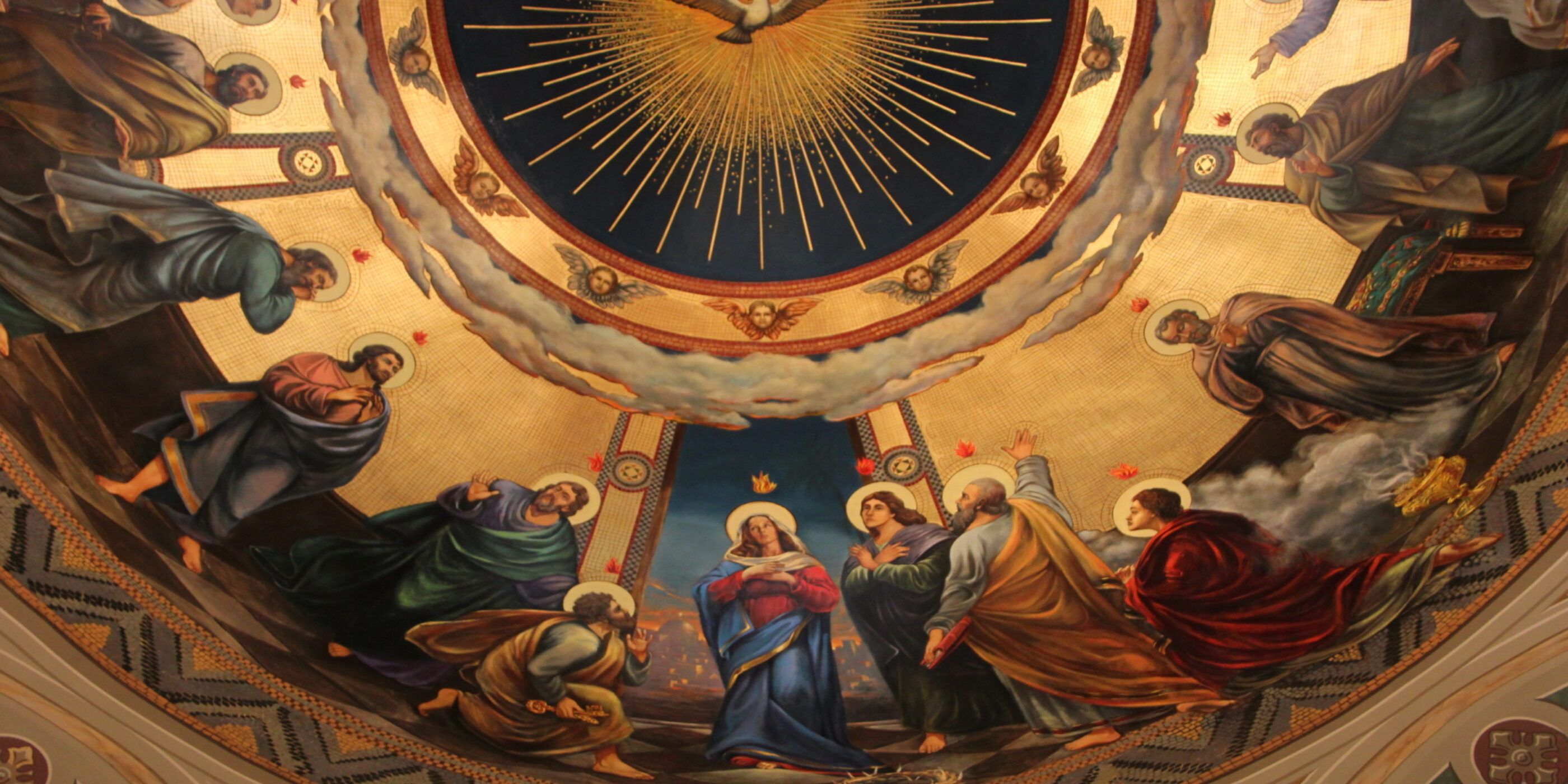For those of us who have become accustomed to worshipping God in the Saint John’s Seminary chapel, we can forget sometimes what a blessing it is to pray here. In fact, three features of this sacred place help to explain this Sunday’s Gospel passage.
In the late nineteenth century, at the invitation of Archbishop John Williams the first priests arrived to staff Boston’s ecclesiastical seminary. These Sulpician fathers had come from Europe and from Maryland with books to fill the seminary library and statues of the Blessed Virgin Mary and St. John the Evangelist which still today adorn the grounds adjacent to the seminary buildings. These men—some of whom are pictured in the hallway by the seminary entrance—traced their lineage to Jean-Jacques Olier, the Sulpician founder of the seventeenth century.
As parish priest of Saint-Sulpice in Paris he discovered in that church’s image of Pentecost the paradigm of his reform for seminary education. Thus, seminaries constructed according to the Sulpician vision include the depiction of Pentecost in the apse. The apostles gathered together around the Blessed Virgin Mary awaiting the outpouring of the Holy Spirit will be sent out to the preach the Gospel. Today’s seminarians gather together with the Mother of God awaiting sacramental ordination to be sent out to preach in our time.

We learn in the Gospel today that there is no private Christianity. Live and let live may be a motto of secular modernity but finds no place in the Christian worldview. The injunction today to make fraternal correction—go and tell your brother if he has sinned against you—reminds us that Christians remain very much concerned with how others live. We want the best for them after all. Fraternal correction is an act of charity (ST II-II, q. 33, a. 1).
Christians are not independent contractors. Like the apostles gathered at Pentecost, we discover our very identity in the community of believers. Today’s Gospel passage reminds us that Catholic faith is personal but never private. It is always ecclesial—the baptized are bound together in the Church. Like Cardinal Seán often says: Christ is not a widower but a bridegroom. He is not a bachelor. You meet Christ in His Church, never apart from the Church.
All the more so for priests: we recall that like the apostles, a priestly vocation requires being a member of the apostolic band. There are no lone-ranger priests. In the words of Benedict XVI: “You cannot be a priest on your own.”
The second feature the Brighton seminary chapel offers for our meditation recalls the connection of every Catholic to the universal Church. The images of the apostles on our chapel’s walls take their place as replicas of the statues that adorn the nave of the Basilica of St. John Lateran in Rome—the Pope’s cathedral church.
The lesson is clear: future priests will preach the apostolic faith. They do not go forth with private revelations or their own spiritual musings. Priests are not meant to sprinkle pious aphorisms on the important moments of people’s lives. Instead, Christ confides to them the saving truths of the Gospel. Small wonder the Church insists future priests spend years of philosophical and theological study to ensure they grasp sufficiently—and can articulate clearly—these salvific truths.
In today’s Gospel we learn that if personal fraternal correction proves unfruitful, one should bring the matter to the Church. That is to say, the divine constitution of the Church is not a matter subject to revision. Bishops govern dioceses, not lawyers or media consultants. Priests obey bishops not the prevailing winds of their time nor their own personal preferences. As the Basilica of St. John Lateran reminds Catholics the world over, the Church rests on apostolic foundations. She is upheld not by clever strategies or political expediencies but by the faith entrusted to the apostles and their successors the bishops, and, by extension, to Catholic priests in union with them.
Third, the image of the Pelican on the tabernacle in the sanctuary recalls the ancient belief that the Pelican pierced its breast to feed its young with its own blood. From the earliest days, the Pelican has served as an image of the Eucharistic Christ whose sacrificial love provides us with the food for Heaven. In a word, there is no communion without sacrifice.
Living today’s Gospel will not prove easy. Making fraternal corrections will not unfold without sacrifice. No Christian—and still less no future priest—will be able to uphold the divine and apostolic constitution of the Church absent a willingness to suffer. All that is to say, we cannot live like the apostles gathered as one body nor study assiduously the apostolic faith without overcoming challenge. Put simply, priests and future priests need to embrace sacrificial love.
The Saint John’s Seminary chapel reveals the communal, apostolic, and sacrificial dimensions of Catholic faith. As it is expressed in today’s Gospel, we do well to recall our essential interconnectedness, our abiding relationship to the Church as constituted by Christ and entrusted to the apostles, and the necessarily sacrificial experience of Christian and priestly life.
Thanks to our Sulpician forebears all that is revealed in Brighton’s seminary chapel. Indeed, what a blessing it is to pray in this place.

